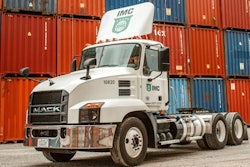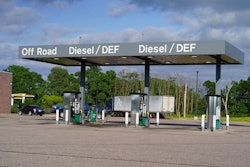A group of heavy truck and engine manufacturers on Monday formally filed a lawsuit challenging the Clean Truck Partnership (CTP) the companies signed in 2023 with California's Air Resources Board (CARB) – a handshake agreement that CARB argues obligates OEMs to abide by CARB emissions regulations even though the regulations themselves have been revoked.
Daimler Truck North America (DTNA), Paccar, International Motors and Volvo Trucks North America (VTNA) in their lawsuit are seeking an injunction, and argue that when President Donald Trump in June walked back Biden-era Environmental Protection Agency waivers relating to California Truck Emission Standards (CARB's Omnibus rule) and California Truck NOx Emission Standards (CARB's Advanced Clean Trucks regulations), it also rendered the CTP moot.
"Notwithstanding that new legislation, California continues to demand compliance with its heavy-duty emissions standards, and it has threatened Original Equipment Manufacturers (OEMs) that design, develop, manufacture and sell heavy-duty vehicles and engines – four of whom are Plaintiffs here – with civil sanctions and un- favorable regulatory treatment if the OEMs refuse to comply with the State’s unlawful standards, while also taking measures to insulate itself from lawful challenges to those standards," the companies wrote in their 71-page suit against CARB, CARB Executive Officer Steven Cliff, and California Governor Gavin Newsom. "CARB cannot use the Clean Truck Partnership as a backdoor to enforce California’s preempted emissions standards. Even if it could, CARB has not met – and indeed cannot meet – several of its own obligations under the Clean Truck Partnership. As a result, CARB cannot use the Clean Truck Partnership to force the industry to comply with California’s emissions standards."
Senior Clean Vehicles Advocate for the Natural Resources Defense Council Guillermo Ortiz called the lawsuit, "a cynical reversal of course. These companies helped negotiate the Clean Truck Partnership to secure regulatory certainty. Now they’re trying to dismantle the very deal they shaped—injecting instability into a market they claim to lead," he said. "This is bad faith, plain and simple, and it raises questions about whether these manufacturers are serious about their ability to deliver clean trucks to the global stage."
Inconsistent regulatory requirements created an unstable and untenable landscape for manufacturers of heavy-duty trucks and engines and their customers, the group claims. Among other things, the misaligned federal and California emissions standards provided OEMs with barely two years of lead time to comply with California’s aggressive emissions standards, "a woefully inadequate compliance window given that the Clean Air Act itself mandates a minimum of four years of lead time for any new pollutant standards for heavy-duty vehicles," according to the lawsuit.
Other signatories of CTP include Cummins, Ford Motor Company, General Motors Company, Hino Motors Limited, Isuzu Technical Center of America, Paccar, Stellantis N.V., and the Truck and Engine Manufacturers Association (EMA).
DTNA, Paccar, International and VTNA claim in their lawsuit that California is trying to use the CTP, "to compel an entire industry to follow California emissions standards that are now in conflict with federal law, and which have been expressly preempted by federal law... CARB cannot attempt to enforce through a misapplied Clean Truck Partnership what federal law prohibits it from doing as a regulator..."
The U.S. Department of Justice last week sent a letter to the OEMs reinforcing disapproval of California’s waivers by the federal legislative action that rendered California’s standards preempted, and further explained that it also preempted the CTP, calling the agreement “the regulatory mechanism by which CARB attempts to enforce preempted California emissions standards."
As part of the CTP, the OEMs agreed not to support legal challenges in implementation in California and other states that follow CARB's regulations, which the suit claims "further limits 'advocacy' by EMA and manufactures in any state that is considering adopting CARB’s Omnibus Low NOx or Advanced Clean Trucks."
"In sum, through the Clean Truck Partnership, CARB sought to impose industry-wide emissions standards and certification requirements, in a manner that would insulate those standards from litigation challenging CARB’s regulatory authority, from any future industry criticism, and from any potential industry-supported judicial review," the lawsuit says. "CARB imposed the Clean Truck Partnership in its capacity as an industry regulator, not in its capacity as a market participant."
CARB in a catch-22
The CTP requires CARB to substantively amend its Advanced Clean Trucks (ACT) and Omnibus Low NOx rules, largely for the purpose of harmonization of state and federal emissions standards, the suit claims. However, since the waivers for Advanced Clean Trucks and Omnibus Low NOx have been revoked, those standards are no longer in play. EPA cannot reissue CARB’s waivers for those standards without a subsequent act of Congress.
"In particular," the suit claims, "CARB’s commitment in the Clean Truck Partnership to align the emissions standards in Omnibus Low NOx with EPA’s corresponding emissions standards is now impossible. CARB has not, and cannot, fulfill this obligation consistent with federal law."
When CARB signed the CTP, the OEMs charge, it also committed “to work together” with manufacturers “to resolve any issues that may warrant regulatory amendments to either the Omnibus or ACT regulations." However, in June, CARB amended its ACT rule to create flexibility around how OEMs earn and use ZEV credits, including a new “pooling” option for OEMs to use within opt-in states and a credit offset program where OEMs can use Class 2b-3 and Class 4-8 truck credits to offset deficits in Class 7-8 tractor segment. CARB did so, the OEMs allege in their suit, "without engaging with the industry in the manner contemplated by Clean Truck Partnership or addressing the industry’s objections and concerns filed during the comment process."
CARB has also refused to work with the manufacturers to resolve issues related to infrastructure and customer demand that undermine the viability of ACT, the group claims. Among other things, CARB has proposed to withdraw the sections of Advanced Clean Fleets that would have required trucking fleets to purchase zero-emission trucks. "In other words, CARB has removed the buy-side requirement corresponding to the sales mandates imposed on manufacturers by Advanced Clean Trucks, thereby making manufacturer compliance with Advanced Clean Trucks even more challenging," the lawsuit says.
"Do these companies have any idea how to sell their own products? Imagine being a truck company, working for years towards an agreement with the world's fourth largest economy that helps you sell electric trucks and finance infrastructure despite federal uncertainty... and then burning your regulators and destroying shareholder value by blowing up that agreement," said Craig Segall, former CARB Deputy Executive Officer and Assistant Chief Counsel who helped negotiate the CTP. "Red flags abound."
Legal challenges mount
The CTP and its signatories are under legal fire from numerous directions.
Nebraska Attorney General Mike Hilgers in November filed an antitrust lawsuit against the truck makers over the agreement. Hilgers on Monday dropped his lawsuit.
The American Free Enterprise Chamber of Commerce in December sued CARB and the CTP signatories – including DTNA, Paccar, International and VTNA – seeking a declaratory judgment that the CTP is preempted and unlawful and an order enjoining the Clean Truck Partnership’s enforcement.










